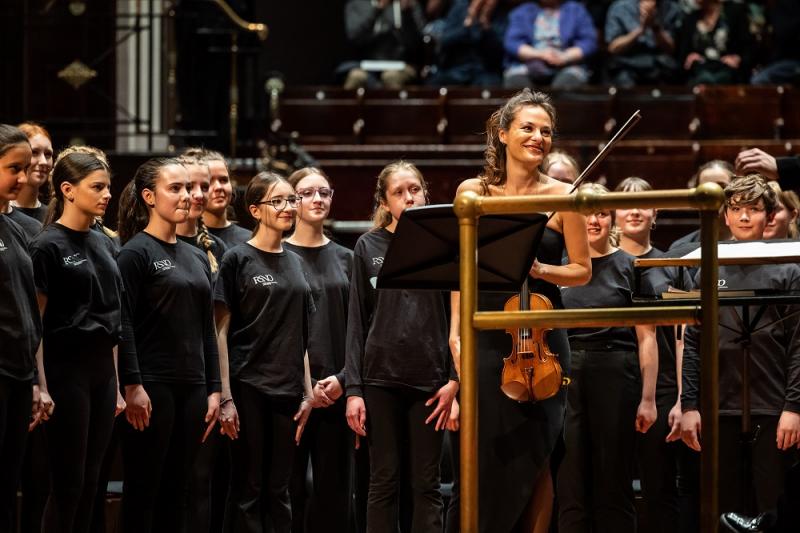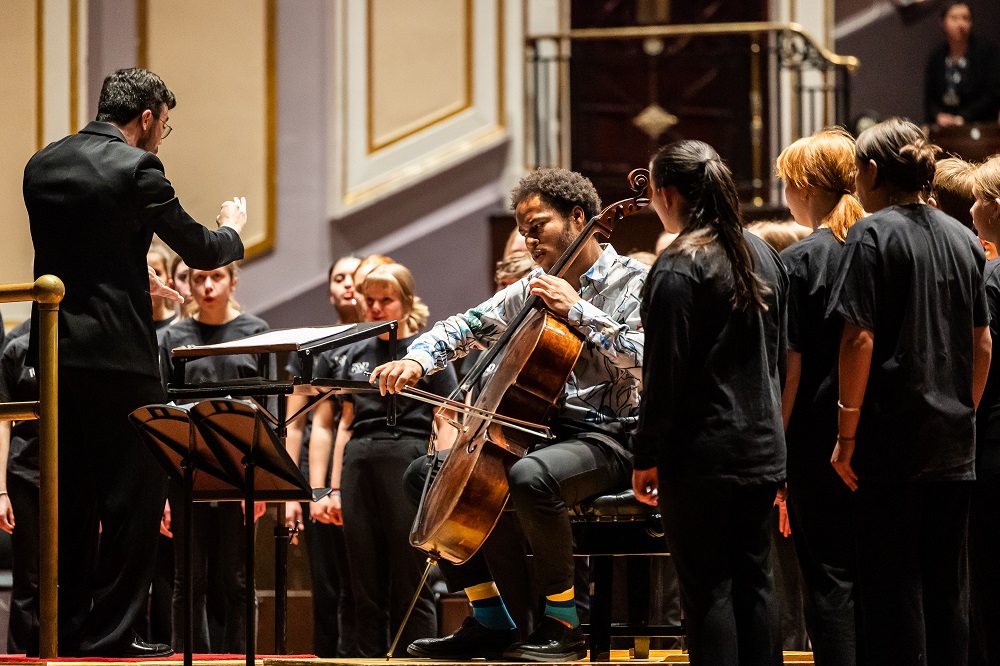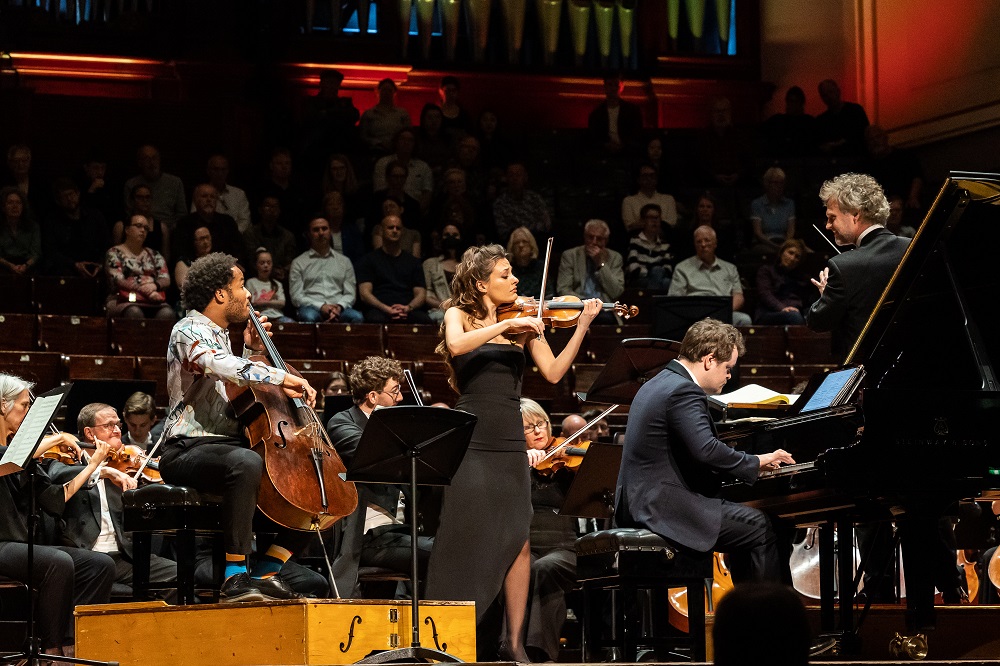Benedetti, Kanneh-Mason, Grosvenor, RSNO, Søndergård, Usher Hall, Edinburgh review - gorgeous textures, starry soloists | reviews, news & interviews
Benedetti, Kanneh-Mason, Grosvenor, RSNO, Søndergård, Usher Hall, Edinburgh review - gorgeous textures, starry soloists
Benedetti, Kanneh-Mason, Grosvenor, RSNO, Søndergård, Usher Hall, Edinburgh review - gorgeous textures, starry soloists
'All Star Gala' shines as much in the contributions of the regulars as in its guests

What’s better than having a star soloist on the billing for a concert? Three star soloists! The Royal Scottish National Orchestra billed this concert as its “All Star Gala”, and that’s more than just a shrewd marketing move (though it was that: this was the busiest audience they’ve had all season).
While they’re here, however, the orchestra wisely decided to put their guests’ talents to wider use by performing three short, relatively new choral pieces with the RSNO Youth Chorus, each of which has a solo accompaniment from violin, cello or piano. The pick of them was Caroline Shaw’s Its Motion Keeps, a gorgeous texture of overlapping musical lines that often seemed entirely disconnected from one another but produced an overall effect was nothing short of bewitching, helped by Benedetti’s violin hovering above.  I also enjoyed Russell Hepplewhite’s The Death of Robin Hood, a theatrically paced and dramatically coloured narrative with an ever-changing line of energy for Kanneh-Mason’s cello (Kanneh-Mason and RSNO Youth Chorus members conducted by Patrick Barrett pictured above). I was less gripped by Errollyn Wallen’s Inherit the World with its mostly unison vocal line and a piano part so rhapsodic that it sounded simultaneously improvised and uninspired. The singing of the chorus in all three, however, was superb, their sound admirably focused and wonderfully controlled, with all the nuances brought out delicately but firmly. That’s a testament to the marvellous work that Patrick Barrett has done with them in recent years. As their choral director, his work has been little short of transformational.
I also enjoyed Russell Hepplewhite’s The Death of Robin Hood, a theatrically paced and dramatically coloured narrative with an ever-changing line of energy for Kanneh-Mason’s cello (Kanneh-Mason and RSNO Youth Chorus members conducted by Patrick Barrett pictured above). I was less gripped by Errollyn Wallen’s Inherit the World with its mostly unison vocal line and a piano part so rhapsodic that it sounded simultaneously improvised and uninspired. The singing of the chorus in all three, however, was superb, their sound admirably focused and wonderfully controlled, with all the nuances brought out delicately but firmly. That’s a testament to the marvellous work that Patrick Barrett has done with them in recent years. As their choral director, his work has been little short of transformational.
The performance of the Triple Concerto (Benedetti, Kanneh-Mason, Grosvenor, Søndergård and RSNO pictured below) was no doubt helped by the fact that this trio of soloists has performed it together several times across the UK this Spring. That meant there was lots of listening to one another and never any sense of one instrument stealing the spotlight.  The orchestra played with energy, too, though conductor Thomas Søndergård kept the weight of the sound on a pretty tight leash, presumably for reasons of balance. That was a pity because it’s a rare treat to hear this piece in the concert hall at all, let alone hearing it performed by a full-scale symphony orchestra. Only in the gorgeous slow movement, rich with bass tone, did some of that luxurious sound come through.
The orchestra played with energy, too, though conductor Thomas Søndergård kept the weight of the sound on a pretty tight leash, presumably for reasons of balance. That was a pity because it’s a rare treat to hear this piece in the concert hall at all, let alone hearing it performed by a full-scale symphony orchestra. Only in the gorgeous slow movement, rich with bass tone, did some of that luxurious sound come through.
Brahms’ First Symphony, on the other hand, benefited from it hugely. This was large-scale, old-fashioned Brahms, and was all the better for it. I’ve never been convinced by the chamber orchestra approach to Brahms’ symphonies: for me the losses outweigh the gains, and I’d much rather the music was allowed to sweep you up in its scope. Here, it did, both in the strength of its overall sweep and in its beautifully played solos. Each of those orchestral players who got a final ovation deserved it every bit as much as did their special guests.
rating
Explore topics
Share this article
Add comment
The future of Arts Journalism
You can stop theartsdesk.com closing!
We urgently need financing to survive. Our fundraising drive has thus far raised £49,000 but we need to reach £100,000 or we will be forced to close. Please contribute here: https://gofund.me/c3f6033d
And if you can forward this information to anyone who might assist, we’d be grateful.

Subscribe to theartsdesk.com
Thank you for continuing to read our work on theartsdesk.com. For unlimited access to every article in its entirety, including our archive of more than 15,000 pieces, we're asking for £5 per month or £40 per year. We feel it's a very good deal, and hope you do too.
To take a subscription now simply click here.
And if you're looking for that extra gift for a friend or family member, why not treat them to a theartsdesk.com gift subscription?
more Classical music
 BBC Proms: Barruk, Norwegian Chamber Orchestra, Kuusisto review - vague incantations, precise laments
First-half mix of Sámi songs and string things falters, but Shostakovich scours the soul
BBC Proms: Barruk, Norwegian Chamber Orchestra, Kuusisto review - vague incantations, precise laments
First-half mix of Sámi songs and string things falters, but Shostakovich scours the soul
 BBC Proms: Alexander’s Feast, Irish Baroque Orchestra, Whelan review - rapturous Handel fills the space
Pure joy, with a touch of introspection, from a great ensemble and three superb soloists
BBC Proms: Alexander’s Feast, Irish Baroque Orchestra, Whelan review - rapturous Handel fills the space
Pure joy, with a touch of introspection, from a great ensemble and three superb soloists
 BBC Proms: Moore, LSO, Bancroft review - the freshness of morning wind and brass
English concert band music...and an outlier
BBC Proms: Moore, LSO, Bancroft review - the freshness of morning wind and brass
English concert band music...and an outlier
 Willis-Sørensen, Ukrainian Freedom Orchestra, Wilson, Cadogan Hall review - romantic resilience
Passion, and polish, from Kyiv's musical warriors
Willis-Sørensen, Ukrainian Freedom Orchestra, Wilson, Cadogan Hall review - romantic resilience
Passion, and polish, from Kyiv's musical warriors
 BBC Proms: Faust, Gewandhausorchester Leipzig, Nelsons review - grace, then grandeur
A great fiddler lightens a dense orchestral palette
BBC Proms: Faust, Gewandhausorchester Leipzig, Nelsons review - grace, then grandeur
A great fiddler lightens a dense orchestral palette
 BBC Proms: Jansen, Royal Concertgebouw Orchestra, Mäkelä review - confirming a phenomenon
Second Prom of a great orchestra and chief conductor in waiting never puts a foot wrong
BBC Proms: Jansen, Royal Concertgebouw Orchestra, Mäkelä review - confirming a phenomenon
Second Prom of a great orchestra and chief conductor in waiting never puts a foot wrong
 BBC Proms: Royal Concertgebouw Orchestra, Mäkelä review - defiantly introverted Mahler 5 gives food for thought
Chief Conductor in Waiting has supple, nuanced chemistry with a great orchestra
BBC Proms: Royal Concertgebouw Orchestra, Mäkelä review - defiantly introverted Mahler 5 gives food for thought
Chief Conductor in Waiting has supple, nuanced chemistry with a great orchestra
 Dunedin Consort, Butt / D’Angelo, Muñoz, Edinburgh International Festival 2025 review - tedious Handel, directionless song recital
Ho-hum 'comic' cantata, and a song recital needing more than a beautiful voice
Dunedin Consort, Butt / D’Angelo, Muñoz, Edinburgh International Festival 2025 review - tedious Handel, directionless song recital
Ho-hum 'comic' cantata, and a song recital needing more than a beautiful voice
 Classical CDs: Dungeons, microtones and psychic distress
This year's big anniversary celebrated with a pair of boxes, plus clarinets, pianos and sacred music
Classical CDs: Dungeons, microtones and psychic distress
This year's big anniversary celebrated with a pair of boxes, plus clarinets, pianos and sacred music
 BBC Proms: Liu, Philharmonia, Rouvali review - fine-tuned Tchaikovsky epic
Sounds perfectly finessed in a colourful cornucopia
BBC Proms: Liu, Philharmonia, Rouvali review - fine-tuned Tchaikovsky epic
Sounds perfectly finessed in a colourful cornucopia
 BBC Proms: Suor Angelica, LSO, Pappano review - earthly passion, heavenly grief
A Sister to remember blesses Puccini's convent tragedy
BBC Proms: Suor Angelica, LSO, Pappano review - earthly passion, heavenly grief
A Sister to remember blesses Puccini's convent tragedy
 BBC Proms: A Mass of Life, BBCSO, Elder review - a subtle guide to Delius's Nietzschean masterpiece
Mark Elder held back from blasting the audience with a wall of sound
BBC Proms: A Mass of Life, BBCSO, Elder review - a subtle guide to Delius's Nietzschean masterpiece
Mark Elder held back from blasting the audience with a wall of sound

Comments
I saw the Glasgow concert the